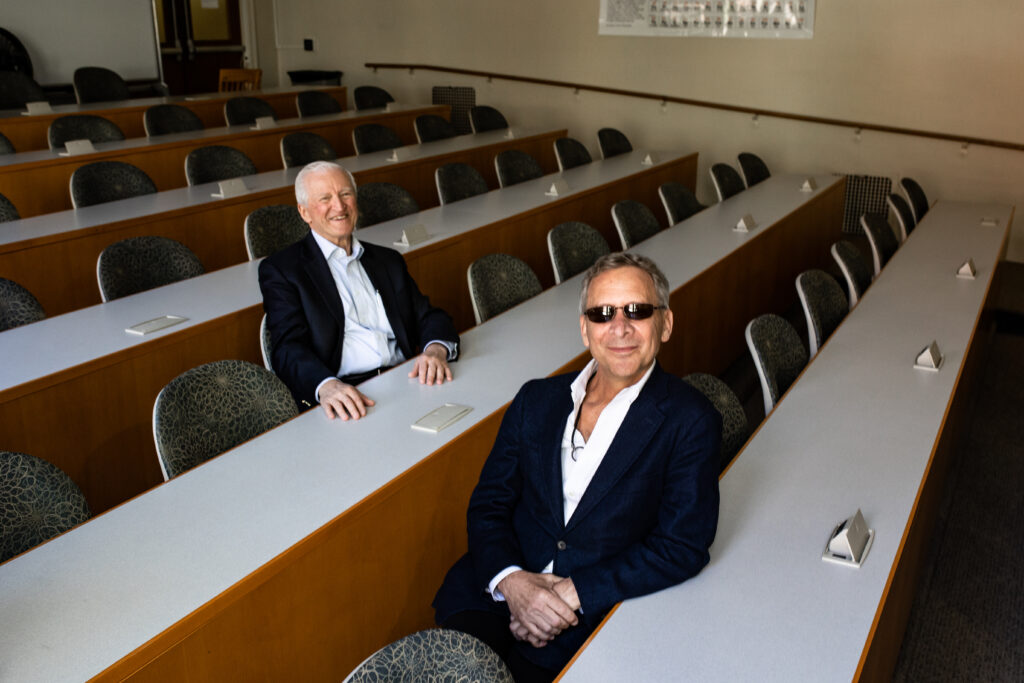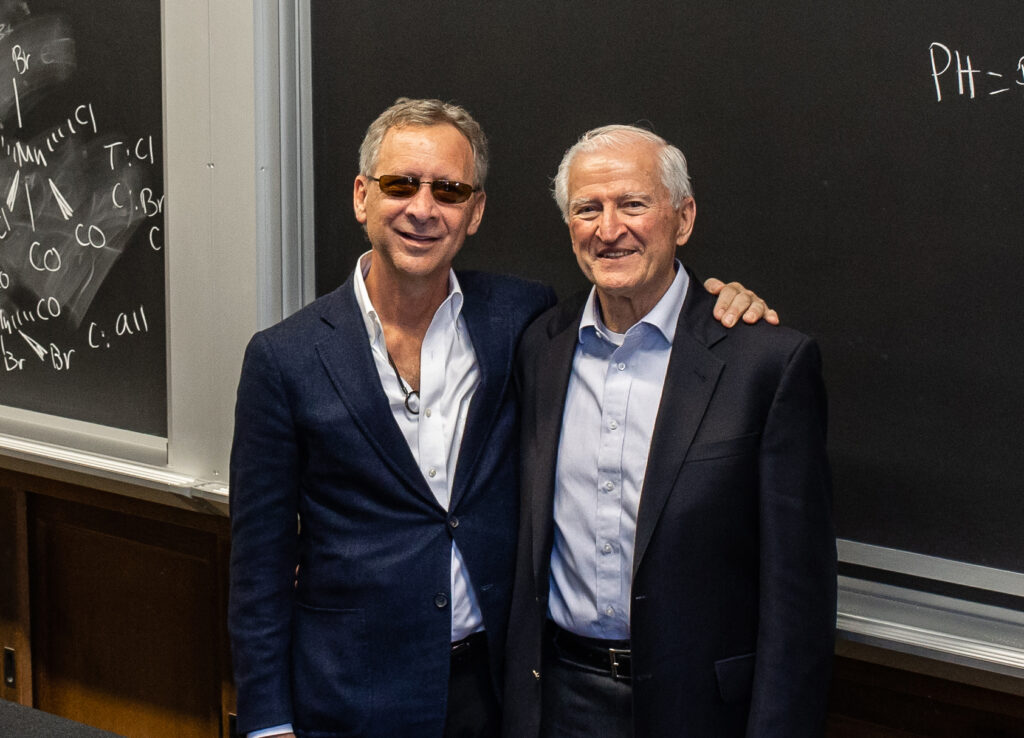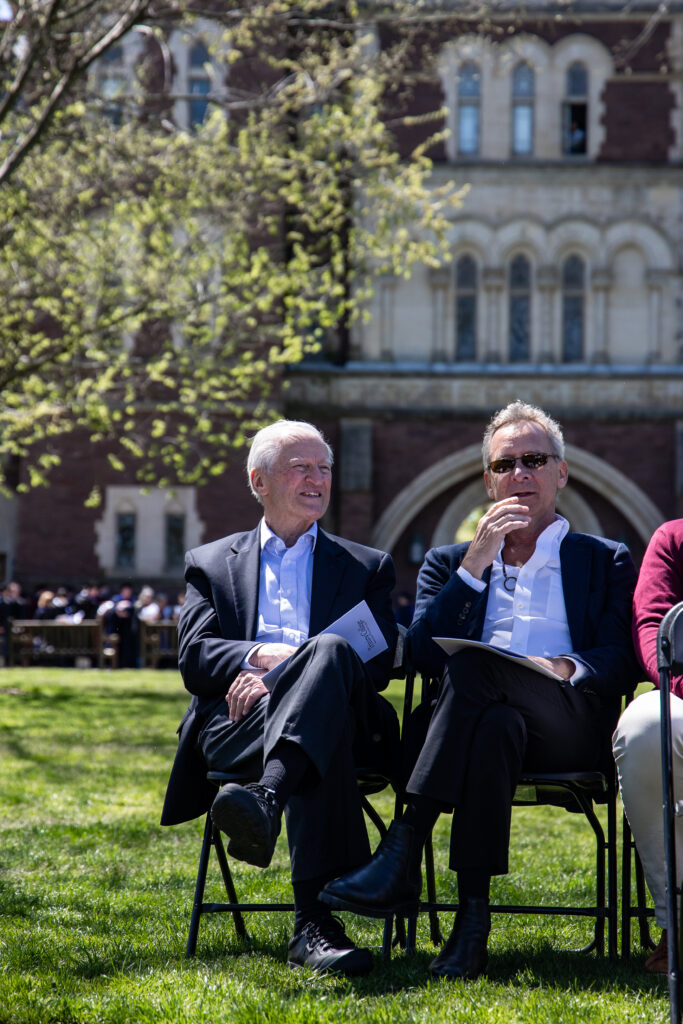Mario Family Foundation Gift to Create Chemistry Professorship Honoring Henry DePhillips
EDITOR’S NOTE: When this story was originally published in 2022, the intended name of the endowed professorship established as a gift from the Mario Family Foundation was the Gregory G. Mario ’87 Professorship of Chemistry. Its name was changed in February 2025 to the Dr. Henry A. DePhillips, Jr. Chemistry Professorship.
“The greatest honor I’ve ever received” is how Henry DePhillips, Vernon K. Krieble Professor of Chemistry, Emeritus, described a new endowed professorship—the Dr. Henry A. DePhillips, Jr. Chemistry Professorship—being established at Trinity College through a gift from the Mario Family Foundation, the family foundation of his former student and advisee Gregory Mario ’87.

Mario, CEO of TAXIS Pharmaceuticals Inc., said, “This is a way to recognize the impact and influence that Henry has had in my life and in the lives of so many Trinity students. I don’t think I’d be doing what I’m doing if it weren’t for Henry’s passion for mentoring and shaping future chemistry majors.”
At TAXIS, Mario and his partners work to develop new drugs to treat superbugs—multidrug-resistant bacterial infections such as MRSA (methicillin-resistant Staphylococcus aureus). “The scientific method is how I operate—you respect the data,” said Mario, who recalled when DePhillips helped him secure a job as a student, working weekends in a Hartford Hospital lab testing cardiac medicines.
“Trinity College was an awakening for me, and now I’m applying what I learned at Trinity under Henry’s tutelage to make an impact in saving lives with pharmaceuticals,” said Mario, who returns to campus every few years and visits with DePhillips. “I think there’s a correlation between success and the passion that you have for the topic,” said Mario. “The key driver in academics is the professor, who influences the passion of the student. Henry was my first academic mentor, and he positively changed my thought process and life.”

When DePhillips first joined the Chemistry Department in 1963, he was one of just four faculty members in the department. Today, there are 12 faculty members, including two who split their time between chemistry and neuroscience or environmental science. Chemistry Department Chair and Vernon K. Krieble Professor of Chemistry Tim Curran said, “The addition of the Henry DePhillips professor will be transformational for this department and our students. Every chemistry professor represents more students we can work alongside, engage, and inspire.”
Curran noted that in the last 10 years, the department has graduated an average of 14 chemistry and biochemistry majors per year. Of the 137 students who graduated in that time, 38 have gone on to graduate studies in chemistry or related fields. Said Curran, “Our chemistry students are truly exceptional, winning prizes at the American Chemical Society regional conferences and publishing a co-authored article in the Journal of the American Chemical Society. Two recent graduates received the Barry Goldwater Scholarship, a prestigious award for students aspiring to pursue a Ph.D. in their major.”
DePhillips, who retired from full-time teaching in 2012, has led a career of achievement and recognition, including receiving the Thomas Church Brownell Prize for Teaching Excellence (2000) and serving as interim dean of the faculty (1995–96). For the first 25 years of his teaching career, he was a protein chemist who analyzed the proteins of sea creatures. Then, in 1986, he began exploring the realm of art treasures through conservation science. That shift in focus came about after DePhillips played tennis with the then-head of the Wadsworth Atheneum’s conservation lab, who asked whether he knew much about pigments. As DePhillips had worked several summers for his father’s paint manufacturing company, it so happened he was very familiar with the subject.

After completing a pigment analysis for the Atheneum—of microscopic paint samples from a self-portrait by Van Gogh—DePhillips was intrigued by the role science could play in assessing artwork that has deteriorated over time and helping inform the restoration process. Eventually, he became a go-to expert for local, national, and international museums, galleries, and art-conservation laboratories, and he has introduced many Trinity students to this interdisciplinary field, including through the Trinity in Rome program, with his classes taking field trips to major art-conservation projects.
Today, in what DePhillips referred to as “my quote, unquote ‘retirement,’ ” he continues to contribute to the Chemistry Department and often can be found in his Trinity office or lab, which was where legendary chemistry professor and department chair Vernon Krieble invented the super glue Loctite in the 1950s. DePhillips’s current mentee is Donglin Chen ’23, who interned with the Atheneum’s conservation laboratory during summer 2022—with DePhillips serving as her research supervisor—and is applying to conservation graduate programs.
“Chemistry is the best department at Trinity,” said DePhillips. “It’s one of the reasons why I’ve stayed so long. It is a welcoming department, not only to the faculty and staff but also, most importantly, to the students.”
As for the honor that Mario has bestowed upon him with the creation of an endowed, named professorship, DePhillips said, “This recognition from Greg is clearly a capstone to my career.”
